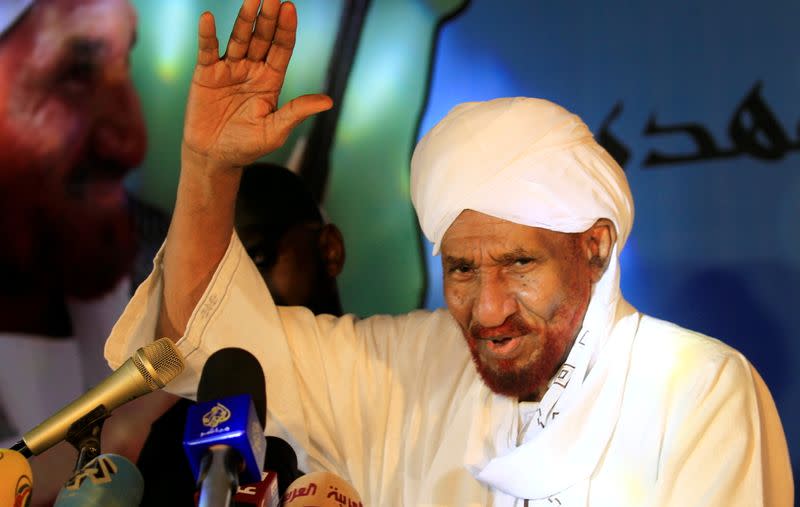Sudan's former PM Sadiq al-Mahdi dies from coronavirus

KHARTOUM (Reuters) - Sadiq al-Mahdi, Sudan's last democratically elected leader and the great-grandson of the messianic figure who fought the British in the 19th century, has died from the coronavirus, his party said on Thursday.
The two-time prime minister who was a central figure in Sudan's political and spiritual life for more than half a century was being treated in the United Arab Emirates.
Current premier Abdalla Hamdok described the 84-year-old as "one of the most important men of thought, politics, literature, and wisdom in our country," as the government declared three days of mourning.
Mahdi's second term in office came to an end with the 1989 military coup that brought a then-obscure army officer, Omar Hassan al-Bashir, to power.
Mahdi escaped detention and went into exile, but his return in 2000 drew tens of thousands of supporters to the airport and his Umma Party went on to become one of the largest opposition parties under Bashir.
He campaigned for a transition back to democratic rule, went into exile again and returned as protests over worsening economic conditions gathered steam. Those demonstrations led to Bashir's overthrow in April 2019.
Mahdi's daughter Mariam Sadiq al-Mahdi, deputy leader of the Umma Party, was among those detained during the demonstrations and has been the party's most visible political figure in political negotiations since.
Opposition parties that were weakened greatly under Bashir's three-decade rule are now jostling for power with the military during Sudan's transition, making the Umma Party's continued unity crucial to maintaining the balance of power.
DETENTIONS, EXILES
Mahdi's supporters said he combined moderate views with hereditary spiritual authority through his group, the Ansar, that was founded by his ancestor "the Mahdi".
But critics highlighted his failure to end a civil war with the south, and his second term as head of government was marked by protests over high prices and economic turmoil.
Mahdi was born on December 25, 1935, in Khartoum's twin city of Omdurman, the former Mahdist capital, and grew up in the last two decades of British imperial rule.
Educated by Italian missionaries and later at Britain's Oxford University, he worked in the Finance Ministry, eventually won a parliamentary seat and had a brief taste of power when he became prime minister in July 1966 aged 30.
The often rapid ebb and flow of Sudanese politics caused him to lose his seat 10 months later and he was arrested in a purge of political parties in 1969 when military man Jaafar Nimeiri seized power.
After fleeing Sudan he tried to return at the head of a guerrilla army to unseat Nimeiri. He failed in his attempt but Nimeiri was removed by the army in 1985. Mahdi was voted prime minister a year later.
Last month, Mahdi's family said he had tested positive for COVID-19. He was transferred to the UAE for treatment a few days later following a brief hospitalisation in Sudan.
The Umma Party said Mahdi would be buried on Friday morning in Omdurman.
(Reporting by Khalid Abdelaziz and Hesham Abdul Khalek, Editing by Angus MacSwan and Andrew Heavens)


